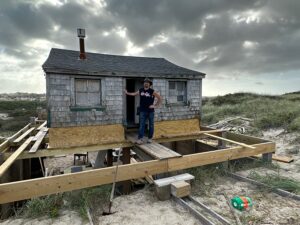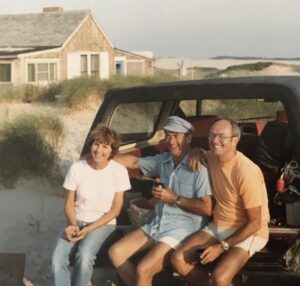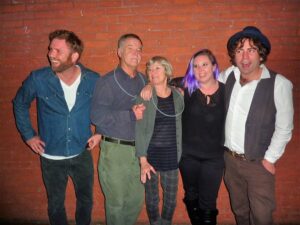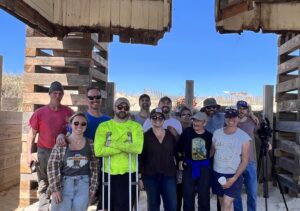PROVINCETOWN — The National Park Service’s public leasing contest for eight dune shacks in the Cape Cod National Seashore took a major step toward resolution on Nov. 15. The right to negotiate 10-year leases has been awarded to three groups of applicants, two of them with connections to longtime residents.

Peter Clemons and Marianne Benson, who have lived in a dune shack they call “The Grail” every summer since 1974, will be offered a 10-year lease along with their adult children, Andrew, Elizabeth, and Tommy Clemons.
A team of four applicants — Talilla Schuster, Josiah Mayo, Chad Avellar, and Hanna Kisialeva — will be offered a 10-year lease for the shack that Schuster’s father, Lawrence Schuster, lived in year-round for three decades beginning in 1984.
Both groups told the Independent that they were exhausted by the leasing process but were celebrating.
At the Adams shack, however, the story was different. Marcia Adams, 94, and her daughter, Sally Adams, initially applied for a lease for the shack that Marcia and her husband, David Adams, had purchased in 1953, before the Cape Cod National Seashore took ownership.
They applied together with David Quinn, a friend who had taken on an increasingly important role in caring for the shack in recent years.

Emptying out the shack and its guest cottage in time for the Park Service’s initial deadline to vacate, Sept. 1, was onerous, according to both Quinn and Sally Adams. But by the time the Park Service extended the deadline to Sept. 29, they had almost fully moved out. Quinn turned in the keys to the shacks on Aug. 25.
The Park Service continued to review their application, asking them on Sept. 29 how they planned to manage sand accretion without the motorized equipment they had been using for the last six years to keep the footings of the shacks from being buried. The Park Service told them they could not use such equipment going forward.
They were given 15 days to answer, Quinn said. They received an email on the 13th day saying they could perhaps use motorized equipment after all, if a park ranger supervised them.
“That’s when we decided that we just didn’t want to go any further,” Quinn said. “The entire process has been a mess and a source of anxiety and distress, and we lost the fight and didn’t want to have all their memories ruined.”
“Our family had the very best of times over 70 years there,” Sally Adams wrote to the Independent, “and the shacks remain an integral part of our family fabric.” The ashes of her father and both her brothers are scattered there, she said.
Quinn said the experience had been “gut wrenching” and blamed “incompetence in the upper echelon” of the Park Service, though both he and Sally Adams said the National Seashore rangers are excellent and deserve recognition.
The Park Service has chosen another applicant to negotiate a 10-year lease for the Adams shack according to a Nov. 16 report in the Boston Globe, but the agency has not said who they selected.
Two Families Continue
“It was a tough summer,” said Andrew Clemons. “Grace Bessay, who gave this shack to my parents, called it ‘the Grail’ because she believed in it so much. She would have fought this, and I knew I was going to fight it.”

Over the course of the summer, Peter and Andrew spoke to news outlets across the Northeast about the Park Service’s leasing program, which included a clause allowing applicants to offer an unlimited amount of extra rent to make their proposals more competitive. That provision was not in the agency’s management plan for the dune shacks, which had been developed in a public process from 2009 to 2012.
“I can’t afford a lawyer; all I have is my family’s story,” Andrew said. “We’ve done a good job of keeping it a family-oriented shack, being part of the community, doing the upkeep — so what are they going to do, kick us out because somebody else makes more money than we do?”
Private residential use was the only type allowed in the Park Service’s request for proposals. In a phone call in May, Cape Cod National Seashore Supt. Brian Carlstrom had tried to assure Peter Clemons that other applicants for private residential use of the Grail were unlikely to be picked if his family submitted a well-written application.

In public, however, Carlstrom defended the clause allowing unlimited rent as a “sound business practice” — even after it was criticized by the select boards of Provincetown and Truro and all of Cape Cod’s elected state and federal lawmakers.
Ultimately, after several deadline extensions, the Park Service picked the Clemons-Benson family after all.
“Obviously we’re grateful that we didn’t have to be evicted,” Peter Clemons said. “We’ve been on pins and needles, but it felt more like a knife edge, really.”
Raising a Shack
The Braaten-Schuster shack was Lawrence Schuster’s year-round home for almost 30 years, said his daughter, Talilla Schuster. He had outfitted his shack with solar panels and a mini-wind turbine, she said, but around the time he turned 70 he decided he was too old to live in the dunes and moved to Maine. He is still the permit holder for the dune shack.

Mayo said he had been reasonably confident that the application he filed with Schuster, Avellar, and Kisialeva would win — mostly because they had put a great deal of time and money into raising the shack out of an encroaching sand dune.
Raising a shack can easily cost $50,000 or more, Schuster said — although free labor from friends can help. The team of four had filed documents to raise the shack in May 2022 and received official approvals that August. It would have been lifted that fall, Schuster said, except their friend Nate Winkler’s heavy equipment was all in use at the Vineyard Wind project.
“We wound up lifting the shack in early May,” Schuster said — after her father had been notified there would be a leasing contest in December 2022 and after the rules allowing applicants to offer extra rent had been released on May 1, 2023. They moved forward, figuring their work could only help their application’s chances.

What made the extra-rent option disturbing, Mayo said, was that “it’s an indication that they really don’t understand the culture or tradition out there at all — so they’re capable of anything.” Limiting residential use from Memorial Day to Labor Day was also a red flag, Mayo said.
“People in our local economy work in the summer,” said Mayo, “and it’s clear they weren’t thinking about them. Who are you really intending on putting in these shacks if you rule out people who work here?”
Now that they have been selected to negotiate a lease, Mayo said, they can find out what those seasonal occupancy rules will mean in practice.
“We think they just phrased it poorly — that they’re really just saying they won’t maintain the roads in the winter,” Schuster said. “The jeep road can actually be easier to drive in winter, so we’re hoping that won’t be a sticking point.”
Editor’s note: An earlier version of this article, published in print on Nov. 23, 2023, misspelled Talilla Schuster’s first name.



